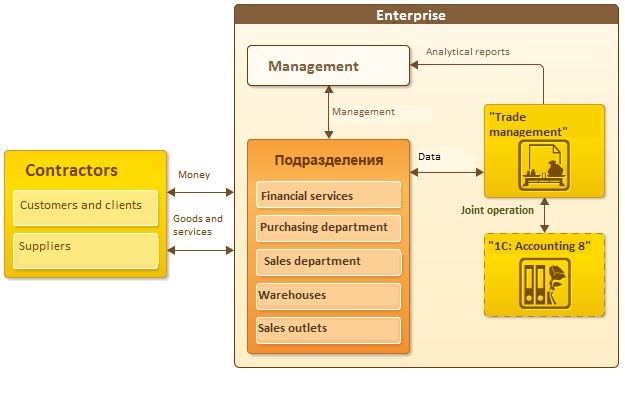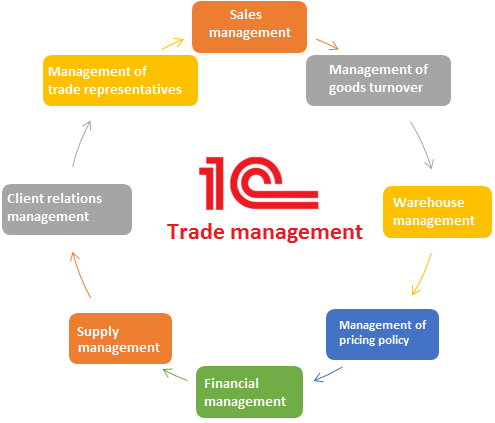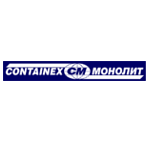By supporting the entire trading cycle, 1C:Trade management (1C:TM) automates the whole process: from analyzing the demand for goods and planning supplies up to shipping.
Apart from that, based on the results of the accounting, 1C:Trade management makes it possible to form various kinds of reports for complex analysis of trading activities of an enterprise.
This software solution includes the mechanism for client segmentation, analysis of customer base dynamics, automatic ABC/XYZ analysis.

"The configuration of 1C: Trade management was developed in the regime of a «Manageable application» of «1C: Enterprise 8.2» platform and uses its new capacities. The aforementioned platform supports operation via Internet using low-speed transmission channels, and also in the regimes of a thin client and of a web-client, and for the operation of the latter you can use different internet-browsers".
The functional blocks of 1C:Trade Management
1C:Trade Management allows to carry out a complex automation of wholesale and retail enterprises due to the existence of 8 functional blocks.

- Complex supply management
- Control of time limits for the delivery of goods
- Control of expenses and timely payments to suppliers
- Control of liabilities
- Registration of payment charts
- Registration of discrepancy at the acceptance of goods
- Analysis of reasons for supplies’ failures (suppliers’ refusal to deliver goods)
- Accounting of additional services and expenses
It allows to enter timely information about the following operations with goods:
Purchasing goods
- Execution of purchase of goods from a supplier
- Execution of purchase of imported goods
- Execution of purchase of goods through an accountable person
- Execution of purchase of goods before the moment of the registration of financial documents
- Reflection of additional expenses on the acquisition of goods, including custom charges
Shipping of goods
- Execution of shipping of goods from different warehouses of a trading enterprise
- Execution of shipping of goods according to a customer’s order issued earlier (invoice for payment)
- Execution of shipping of goods using a debit slip
- Execution of shipping of goods without preassembly
Return of goods
- Execution of shipping of goods in сase of return of goods to a supplier
- Execution of the receipt of the goods in case of return of goods by a customer
Intra-warehouse operations
- Inventory taking in a warehouse and accounting of the inventory results
- Posting of surplus
- Writing off damage and deficiencies
- Transfer of goods to sub-divisions for using in commercial activities
- Transfer of goods between the warehouses
- Formation and sale of product sets requiring preassembly
- Correction of accounting features of the goods (serial numbers, characteristics and quality of goods)
The program has functional for managing trade representatives (trade agents):
- Allocation of trade representatives to clients
- Setting a visiting schedule
- Planning clients’ visits
- Formation of detailed tasks for collecting orders and solving other optional questions
- Automatic creation of clients’ orders
- Fixation of information on the expenses of a trade representative
- Fixation of information about the client
The software allows to perform the following business-processes:
- Price formation for goods for sale
- Storage of information about the prices of the competitors and the suppliers
- Automatic update of purchasing prices
- Comparison of the company’s prices with the prices of the competitors and the suppliers
- Formation of a price-list with sale prices
- Application of discounts and extra charges at the formation of the sales documents
Setting the rules of sales, individual ones as well as typical ones for segments of clients, and also the comprehensive monitoring of the sales processes, both for the entire cycle of sales execution and according to a simplified scheme:
- Payment conditions and charts
- Pricing terms and types of prices
- Organization of marketing actions
- Discounts and extra charges
- Registration and control over pricing and volume-calendar sales conditions, financial terms. Individual agreements on the rules of sales (for important clients)
- Management of order processing
- Formation of commercial offers
- Fixation and control over the delivery and payment charts
- Control over payment arrears, analysis of accounts payable
Regular collection and analysis of information about each client – both a real one and a potential one:
- Personified approach to the needs and demands of each client
- Storage of all the contact information of contractors and their employees, history of communications with them
- Management of sales processes using the business-processes mechanism (transactions with a client)
- Analysis of unfinished transactions and planning future transactions with customers and potential clients
- Registration of each request from a potential client and further analysis of percentage of client solicitation, and also analysis of the satisfaction of the primary demand
- Operative control over the status of the planned contracts and transactions
- Integrated BCG-analysis of client relations
- Registration and prompt processing of the clients’ complaints
- Analysis and evaluation of the efficiency of the managers’ working with clients
Detailed operative accounting of merchandise in storage:
- Management of unsold goods in different units in multiple warehouses
- Conduction of separate accounting of own goods, goods received and transferred for sale
- Detailing of the location of goods in a warehouse at storage facilities, which allows to optimize the assembly of goods in a warehouse
- Organization of cellular storage
- Accounting of a series of goods (serial numbers, shelf lives etc)
- Assignment of arbitrary characteristics of goods (color, size etc.)
- Accounting of Cargo Customs Declaration and countries of origin
- Execution of assembly and disassembly of goods by operations
- Reservation of goods subject to further incomings
- Planning of unsold goods
Conducting the analysis of financial results:
- Cash planning and accounting
- Management of mutual settlements
- Optimized calculation of production costs
- Accounting and allocation of other expenses and costs
- Support of “intercompany” schemes
- Evaluation of VAT accounting
- Control of cash
- Execution and confirmation of requests for payment
- Control of non-cash funds
- Formation of payment calendar
Apart from that, due to the possibility to unload different reports, 1C:Trade management will make it possible for a business to exercise control and perform analysis of target indicators of the company’s activities on the whole.
1C:Trade Management system reflects both completed and planned trade operations, which allows to automate execution of practically all the primary documentation of trade and warehouse accounting, and also cash flow documents.






